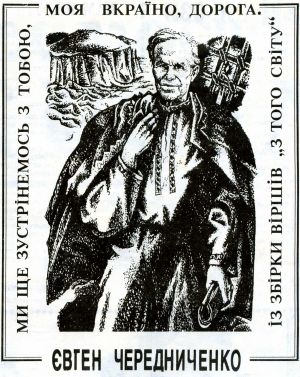Athlete, educator. Member of the OUN, GULAG prisoner (1943-1956). Poet, publicist, enlightener, civic activist.
“My father, a worker, and my mother, a homemaker, were for their seven children an example of honesty, conscience, hospitality, generosity, and hard work; they were a whole world of love and kindness,” wrote Cherednychenko.
He graduated from Fastiv's seven-year School No. 9. In the spring of 1930, he went to join his older brother Volodymyr in the city of Shakhty, where he graduated from a mining and industrial school and worked as a miner.
In 1934, he enrolled in the Moscow Institute of Physical Culture. As a third-year student, he won the title of champion of the Soviet Union in Greco-Roman wrestling. He excelled in gymnastics, acrobatics, swimming, and skiing. From a young age, he wrote poetry.
After graduating from the institute in 1938, he returned to Ukraine. He headed the department of physical culture at the Institute of Food Industry in Kyiv.
During World War II, he joined the Organization of Ukrainian Nationalists (OUN) and was appointed district leader in Fastiv, working under the pseudonym “Stalyi” (The Steadfast). The underground activists distributed leaflets aimed against the occupation regime. They procured food for a Ukrainian Insurgent Army (UPA) detachment commanded by OUN stanitsa leader Volodymyr Kosovsky near Kornyn in the Zhytomyr region. In 1943, during the retreat to the West, Cherednychenko, along with other soldiers, was captured by the Red Army. He attempted to escape. For “bourgeois-nationalist activity” and the escape attempt, he was sentenced to death by the Special Council (OSO). After 33 days, the sentence was commuted to 15 years of penal servitude.
He served his sentence in a special-regime camp of the “Rechlag” administration in Vorkuta (the Arctic), working at mine No. 5 of the “Vorkutaugol” combine, and from 1947, at mine No. 1 “Kapitalnaya.” He composed poems mostly from memory, hiding some of them. A good half of them were forever left behind in the mines.
As someone familiar with medicine from his studies at the Institute of Physical Culture, he was appointed a medical assistant (feldsher). It was there that he met the poet V. Kosovsky, who was severely ill with scurvy. He had him admitted to the infirmary, thus saving him from death. Later, with the help of a doctor from Poland, Władysław Sarnot, he arranged for Kosovsky to work as an orderly.
For his participation in preparing an uprising in the camp in 1953, Cherednychenko, as an experienced and active prisoner, was sent to the Vladimir Prison. A year later, he was transferred to a special-regime camp of the “Ozerlag” administration in Siberia.
He was released in 1956. He taught physical education at Fastiv Secondary School No. 20 (now No. 10). He later worked at the Kyiv Institute for Teacher Professional Development and at the Ministry of Education of Ukraine. Everywhere he went, the sleepless eye of the KGB watched him. On September 4, 1965, he and his wife, Vira Nechyporivna, a teacher of Ukrainian language and literature, were among those who stood up at the call of V. STUS in the “Ukraina” cinema to protest the arrests of the Ukrainian intelligentsia. He and his wife were summoned for questioning many times and were repeatedly dismissed from their jobs. In the 1960s, both taught at a school in the village of Stayky, near Kyiv, where they carried out extensive cultural and educational work.
In the late 1980s and early 1990s, the Cherednychenkos took an active part in many national-democratic actions. Cherednychenko spoke at rallies and in various forums with fervent speeches and militant poems. He was a member of the editorial board of *Zona*, the journal of the All-Ukrainian Society of Political Prisoners and Victims of Repression.
Cherednychenko published two collections of poems at his own expense. He is buried in the Baikove Cemetery in Kyiv. His monument is inscribed with these words:
The world had never known such a prison,
Nor had it known such villainy,
But we remained human,
And we remained ourselves!..
Bibliography:
1.
*Z toho svitu* [From the Other World]. Kyiv: Radianskyi Pysmennyk, 1991.
“We Shall Meet Again, My Dear Ukraine.” *Samostiyna Ukraina*, no. 13, September 1991.
*Voskresinnia: Poezii* [Resurrection: Poems] (foreword by Sv. Koronenko). Kyiv: UKSP “Kobza,” 1993, 116 pp.
Poems. In: *Z oblohy nochi: Zbirnyk nevilnychoi poezii Ukrainy 30 – 80 rr.* [From the Siege of Night: A Collection of Captive Poetry of Ukraine from the 1930s to the 1980s]. Compiled by M. O. Samiylenko. Kyiv: Ukr. pysmennyk, 1993, pp. 445–458.
2.
“Yevhen Cherednychenko” [obituary]. *Zona*, no. 7, 1994, pp. 248–253.
“Yevhen Romanovych Cherednychenko.” fastiv.biz Information and Reference Portal of the City of Fastiv.
Khorunzhy, Yuriy. *Muzhi chynu: Istorychni parsuny* [Men of Action: Historical Portraits]. Kyiv: Olena Teliha Publishing House, 2005, pp. 342, 343, 353, 361, 363.
*International Biographical Dictionary of Dissidents in Central and Eastern Europe and the Former Soviet Union*. Vol. 1. Ukraine. Part 1. Kharkiv: Kharkiv Human Rights Protection Group; Prava liudyny, 2006, pp. 1–516; Part 2, pp. 517–1020; Part 3, 2011, pp. 1021–1380: Cherednychenko: pp. 1352–1354: https://museum.khpg.org/1299524752.
*The Resistance Movement in Ukraine: 1960–1990. An Encyclopedic Directory*. Foreword by Osyp Zinkevych and Oles Obertas. Kyiv: Smoloskyp, 2nd ed., 2012, pp. 791–792.
Vira Lisova, Vasyl Ovsiienko, Kharkiv Human Rights Protection Group.
Cherednychenko. Characters: 3,986. Last read on May 16, 2016.

CHEREDNYCHENKO YEVHEN POMANOVYCH